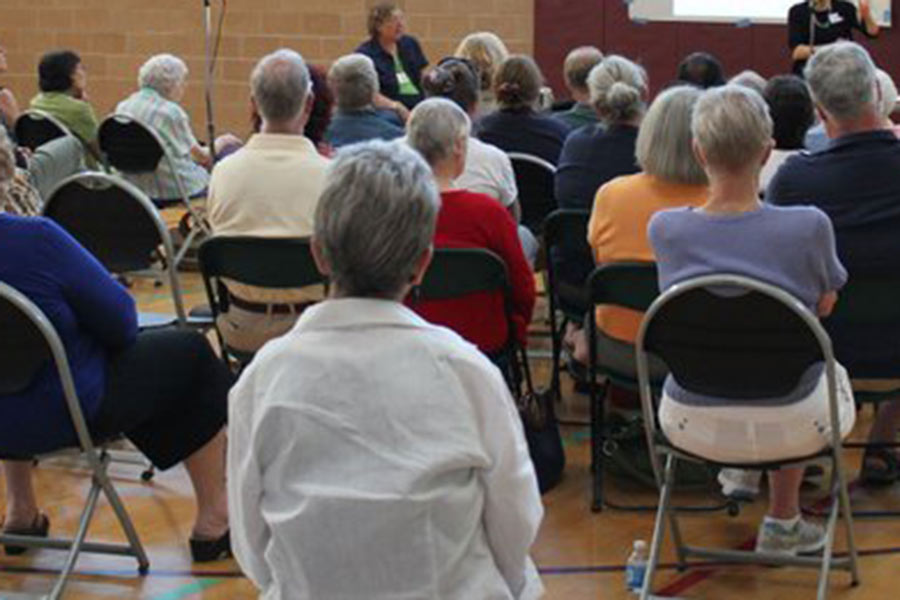Approximately 75 percent of LGBT older adults live alone. It is important, wherever we live, that we remain connected to others in the community for all types of supports. You have probably had the conversation with friends over the years in which someone suggested, “When we get older, we should buy a big house and all move in together. We can take care of each other.” Well, rather than taking that “radical” step and possibly ruining great friendships, here are some other options to consider.
Some of us can take advantage of a beautiful living space like Philadelphia’s LGBT senior-friendly John C. Anderson Apartments or Chicago’s Town Hall. Similar housing developments are popping up across the country. LGBT seniors can live together, in a communal-type space, with some programs and services available that enable them to remain independent in their own homes.
Others choose a version of communal living found in a continuing-care community like Cathedral Village. Some live in a rowhome or condo or co-op. One or two may even live in the apartments they have lived in since they were kicked out of their parents’ home over half a century ago. Whatever the physical living space and situation, most of us will need some type of supports and help along the way so that we can continue to live independently, to take care of ourselves, for as long as possible.
There are different ways to achieve that goal. Organizing support systems to help when help is needed along the way may be the key. One such model of organizing was started at the Beacon Hill Village in Boston in 2002. This type of Village is a dynamic program that helps older adults or younger persons with special needs to live independent lives in the neighborhoods they love. Center City Philadelphia’s Village is called Penn’s Village, a nonprofit, grassroots organization made up of a network of neighbors who volunteer to provide services and programs to their neighbors. These services and supports enable a diverse group of residents in central Philadelphia to live independently in their own homes, and stay active and socially engaged in their community.
Penn’s Village coordinates access to the volunteer-provided services, which include transportation to medical appointments and other errands, assistance with simple chores inside and outside the home and access to a list of carefully screened preferred providers/vendors. Penn’s Village’s newest program, Health Pals, pairs specially trained volunteers with members to help them navigate the health-care system. According to Jane Eleey, Penn’s Village executive director, “A Health Pal volunteer will work with a member to formulate questions, fill out forms, be a second set of ears and assist with follow-up instructions such as scheduling appointments and picking up prescriptions.”
For LGBT older adults, the Village model can provide the back-up plan for those times when we do need assistance with a few activities, but can still remain in our homes and take care of ourselves. For more information about Penn’s Village and the Village model, call 215-925-7333.
Another model of living together, independently, is called “cohousing.” Cohousing communities are intentional, collaborative buildings or neighborhoods designed to bring together the value of private homes with the benefits of more sustainable living. Residents actively participate in the design and operation of their building, and share common facilities and strong connections with neighbors.
One cohousing community currently in the planning stages is Wissahickon Village Cohousing in Northwest Philadelphia. Vanessa Lowe, a member of the group, described it as “a group of people who come together to design the community. One difference from a traditional condo is that there is much more common space because we want to encourage community interaction.”
Lowe explained that the cohousing philosophy is “conscious commitment to living as a community. Anyone can come and participate with us but, to be a member, we have an agreement that we ask people to sign that says that you are pledging that you want to live in this interdependent way. That you want to be involved with us and to be engaged.”
For more information about the cohousing model, visit www.cohousing.org.
Whatever living arrangements you choose, keep in mind the services, supports and connections that you may need from time to time in order to remain independent, in your own home and community. Planning in advance, knowing what resources are available and how to access them can smooth out those inevitable bumps in the road when you will need some type of assistance. For more LGBT senior-friendly housing resources, visit www.lgbtei.org.
Ed Bomba is the co-chair of Liberty Resources, Inc., Philadelphia’s federally designated Center for Independent Living. Bomba also serves on the advisory committee for Penn’s Village and is a volunteer with the LGBT Elder Initiative.

